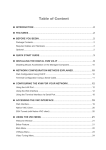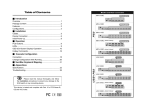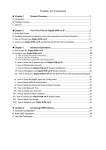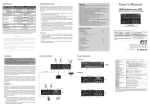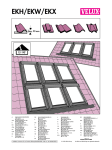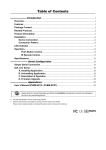Download Table of Contents
Transcript
Table of Contents ■ ■ ■ ■ ■ ■ ■ ■ ■ ■ ■ ■ ■ ■ ■ ■ Introduction ........................................................... 1 Key Features.......................................................... 2 Specifications........................................................ 3 Control Modes and cable Types .......................... 4 Packing Checklist ................................................. 5 Product Description.............................................. 6 Installation ............................................................. 7 Video Compensation ............................................ 9 Operation ............................................................... 10 LED Indicators....................................................... 11 Push Button: Switch to the control status ......... 13 Hotkeys Control .................................................... 15 Station Unit Hotkeys Control ............................... 16 Computer Unit Hotkeys Control .......................... 17 Cascade Configuration......................................... 18 Appendixes............................................................ 19 Please read this manual thoroughly and follow the Installation procedures to prevent any damage to the KVM switch or any connecting device ------------------------ Introduction The KVM Extender consists of a Computer Unit and a Station Unit that is suitable to locate a keyboard/monitor/mouse set up to 150 meters away from a computer or KVM switch using an inexpensive Category 5 UTP (unshielded twisted pair) cable. It provides an ideal and convenient way to remotely access the computer which is located in a secure, clean or dirty, harsh environment. The KVM Extender is designed to enable one computer to be controlled by one or two users. Meanwhile, it is allowed for a console to control two computers locally and remotely. They are perfect to be used in factory or construction areas where you want to secure your computers and valuable data or manage them either in remote or both in remote and local sites. With a variety of models to choose from, you can economically increase the flexibility of your selection and meet your needs for PS/2 or PS/2 + USB system. No software or dip switches are required, just plug and play. With one push button, two LED indicators and simple hotkey commands, you can manage this device easily. There are 8 models available for your choices. Please refer to the following Table 1: Control Status between console and computer. Some of models are connected with 3-in-1 or 2-in-1 special cable(s). For detailed description, please see the Specifications. Figure 1: Connection of 3-in-1 and 2-in-1 cable 1 ------------------------ Key Features Connects the Computer Unit and Station Unit via Category 5 UTP cable Remotely locates the keyboard, mouse and monitor up to 150m from a computer Supports PS/2 and USB + PS/2 series for flexible choice Video compensation can be adjusted by hotkey to ensure the optimum signal quality for any length of cable within the limit. Easy to get and install the standard cable at lower cost Simple indication makes operation user-friendly Locates the computer away from your desk and work area, saving you valuable space Allows two users to share a single computer both in local and remote areas. (EKx-222, EKx-221) Applicable for one console to manage two computers locally and remotely (EKx-222, EKx-212) Beeps confirmation for key control makes the operation easier and cross-checked Supports for standard PS/2 keyboard & mice, including Microsoft IntelliMouse Compatible with XGA, VGA, and SVGA system 2 3 4 ------------------------ Packing Checklist KVM Extender Station Unit x 1 KVM Extender Computer Unit x 1 Power Adapters – 9V DC, 600mA x 1 User Manual x 1 Food Pad x 2 sets KVM Cable (CBM180H or CBM180UH) x 1 or x 2 5 ------------------------ Product Description Figure 4: Indication and Connection 6 ------------------------ Installation Connection Patterns EKP222 / EKU222 EKP-12S EKU-12S EKP-21P EKU-21P EKP212 / EKU212 EKP-12S EKU-12S EKP-11P EKU-11P 7 EKP221 / EKU221 EKP-21P EKU-21P EK-11S EKP211 / EKU211 EKP-11P EKU-11P EK-11S Figure 4: Connection patterns of KVM Extenders 8 ------------------------ Video Compensation Before operating, you may like to conduct the Video Compensation first. In this case, the hotkeys are used to adjust the Equalization on the Remote Unit to get optimum video signal for various cable lengths. There are four segments of various lengths of CAT 5 cables can be chosen from. To achieve the best visibility, the following table can be used as a reference to adjust the video compensation. First, assure that the length of CAT 5 cable you used now. Then, use the hotkeys to adjust the video compensation. You can press Ctrl twice , E and F11 keys followed, and the different beeps sounded to indicate the setup of cable length respectively. Please refer to Operation of Hotkey Control. 9 ------------------------ Operation A keyboard and mouse must be connected to the Station Unit. And then the system conducts the emulation for local computer which can be controlled remotely. On the other hand, it does not need to use keyboard, mouse and monitor if you don’t want to control the computer locally. Anyway, there are 8 different models can be chosen to meet your needs in all aspect. Please refer to the specifications for the model you are in hand and ready to operate in compliance with the following procedure. 10 ------------------------ LED Indicators The LEDs on the KVM Extender are showing the latest status which indicates the linking, communication, and control situation between Computer Unit and Station Unit. Station Unit Model LED Status Control Description Station Unit controls its local PC. In this mode, there are two statuses as follows: 1. The Computer Unit is now taking control of the system if the 3 LEDs (Num, Caps and Scroll Lock ) on the keyboard EKP-12S Remote: Off, Local: On are flashing. 2. The system is waiting for EKU-12S Station Unit or Computer Unit to take control if the 3 LEDs (Num, Caps and Scroll Lock) on the keyboard are not flashing at this moment. Remote: On, Local: Off EK-11S Station Unit is remotely taking control of the Computer Unit. The Station Unit remotely Remote: On controls the Computer Unit Table 3.1: LED - Control indication for Station Unit Power Up LED Status Model No. EKP-12S EK-11S EKU-12S LED Indicators Local: On Remote: On Local: On Table 3.2: The Initial status and indication is displayed when KVM Extender is powered up 11 Computer Unit Model LED Status Control Description Computer Unit controls its local PC or KVM switches. In this mode, the Station Unit Remote: Off, Local: On can not take control of the Computer Unit remotely. EKP-21P EKU-21P Station Unit is remotely Remote: On, Local: Off taking control of the Remote/Local Flashes The system is waiting for alternately Station Unit or Computer (Auto Mode) Unit to take control. Computer Unit EKP-11P EKU-11P The system is controlled Remote: On remotely from Station Unit Table 4.1: LED - Control indication for Computer Unit Power Up LED Status Model No. LED Indicators EKP-21P Local/remote: Flashes alternately EKP-11P Remote: On EKU-21P Local/remote: Flashes alternately EKU-11P Remote: On Table 4.2: The Initial status and indication is displayed when KVM Extender is powered up 12 -----------------Push Button: Switch to the control status There is a button on the panel of Computer Unit and Station Unit respectively, which can be pushed (switched) in sequence to select the operation modes. Button on Station Unit ( EKx-222 / EKx-221 ) The button on the panel of Station Unit can be pushed (switched) in sequence to select the following two modes: Loc → Com(Remote) Local: Remote: The LED of Local is “On”. In this mode, the system controls its local computer. The LED of Remote is “On”. In this mode, the system remotely controls the Computer Unit. 13 Button on Computer Unit ( EKx-222 / EKx-212 ) While pressing the button, there are three modes can be chosen from and its sequence indicates as follows: Auto → Loc → Com(Remote) Auto: 1. In this mode, the Remote and Local LEDs are flashing alternately. 2. The system is now waiting to take control of either from Computer Unit or from Station Unit. Once the keyboard or mouse of Computer Unit is active, the LED of Local is on and the LED of Remote is off. This status indicates that the Computer Unit is now taking control of the system and vice versa for Station Unit. In this case, the latch time period of 5, 15, 30, or 60 seconds is offered to allow the Computer unit or Station Unit to take control again if the latch time is due and the status returns to the “Auto” mode. In “Auto” mode, whenever the keyboard, mouse buttons or scroll wheel of mouse is activated, the Unit (Computer Unit or Station Unit) immediately takes control of the system. Local: Remote: The LED of Local is “On”. In this mode, the system is being controlled by the Computer Unit. In this case, the Station Unit can learn this status from the flashing of 3 LEDs (Num, Caps and Scroll Lock) on the keyboard. The LED of Remote is “On”. In this mode, the system is remotely controlled by the Station Unit. 14 -----------------Hotkeys Control Hotkey command is a short keyboard sequence to select a computer, to activate computer scan, and so forth. The KVM Extender interprets keystrokes for hotkeys all the time. A hotkey sequence starts with two left Ctrl keystrokes followed by one or two more keystrokes. A built-in buzzer generates a high-pitched beep for correct hotkey command, while one short and one long beeps are sounded for wrong commands. Thus, the bad key commands will not be forwarded to the selected modes. There is an unique Hotkey command of Ctrl + Ctrl + Alt+E you should be well aware when the KVM Extenders are connected to other KVM Switches. To switch to this mode, press left Ctrl twice, hold Alt and press E key(press both keys simultaneously). This function is used to prevent from misunderstanding once the system is connected to Rextron’s KVM Switches. Thus, the user can choose either the control mode of KVM Extender or the number of computer connected to the KVM Switches. 15 --------------Station Unit Hotkeys Control Hotkey Commands without Ei optional With Ei optional *Ctrl + Ctrl + Ti Ctrl + Ctrl + Ti Ctrl + Ctrl + Esc Ctrl + Ctrl + Esc Ctrl + Ctrl + Alt+E Ctrl + Ctrl + Alt+E *Ctrl + Ctrl + 1i Ctrl + Ctrl + E + 1i *Ctrl + Ctrl + 2i Ctrl + Ctrl + E + 2i *Ctrl + Ctrl + F2 Ctrl + Ctrl + E + F2 Ctrl + Ctrl + F4 Ctrl + Ctrl + E + F4 (Keyboard speed (Keyboard speed selection) selection) Function Description Toggle switch selects Loc or Com mode Escape from hotkey mode One beep: hotkey control without pressing Ei Two beeps: need to press Ei for hotkey control Select the computer 1 via KVM Switch Loc mode selection Select the computer 2 via KVM Switch Rem mode selection Toggle switch for Loc or Com To adjust typematic rates of keyboard, the KVM Extender generates 1 to 4 beeps corresponding to 6, 12, 20, and 30 characters/sec respectively. To adjust video compensation, the KVM Ctrl + Ctrl + F11 Ctrl + Ctrl + E + F11 (Video Compensation (Video Compensation Adjustment) Adjustment) Extender generates 1 to 4 beeps corresponding to cable length of 0 ~ 40, 40 ~ 80, 80 ~ 120, 120 ~ 150 meters respectively. Ctrl + Ctrl + F12 Ctrl + Ctrl + E + F12 Mouse resynchronized (for PS/2 only) *The hotkey commands are effective for models EKx-222 and EKx-212 only. Table 5: Hotkey control for Station Unit 16 ---------Computer Unit Hotkeys Control Hotkey Commands Function Description without Ei optional with Ei optional Ctrl + Ctrl + Ti Ctrl + Ctrl + Ti Toggle switch selects Auto-Loc-Rem mode Ctrl + Ctrl + Esc Ctrl + Ctrl + Esc Escape from hotkey mode Ctrl + Ctrl + Alt+E Ctrl + Ctrl + Alt+E Ctrl + Ctrl + 1i Ctrl + Ctrl + E + 1i Ctrl + Ctrl + 2i Ctrl + Ctrl + E + 2i Ctrl + Ctrl + 3i Ctrl + Ctrl + E + 3i Ctrl + Ctrl + F3 Ctrl + Ctrl + E + F3 Ctrl + Ctrl + F4 Ctrl + Ctrl + E + F4 (Keyboard speed (Keyboard speed selection) selection) One beep: hotkey control without pressing Ei Two beeps: need to press Ei for hotkey control Select the computer 1 via KVM Switch Loc mode selection Select the computer 2 via KVM Switch Rem mode selection Select the computer 3 via KVM Switch Auto mode selection Auto mode latch time: 5, 15, 30, 60 seconds To adjust typematic rates of keyboard, the KVM Extender generates 1 to 4 beeps corresponding to 6, 12, 20, and 30 characters/sec respectively. Ctrl + Ctrl + F12 Ctrl + Ctrl + E + F12 Mouse resynchronization (for PS/2 only) *All hotkey commands are effective for models EKx-222 and EKx-221 only. Table 6: Hotkey control for Computer Unit Alt+E : Hold Alt and press E key(press both keys simultaneously). Mouse resynchronization: When the mouse can not work normally, conduct this function and make it synchronized with your system. 17 -----------------Cascade Configuration The KVM Extender can be connected to the KVM Switch in compliance with the “Cascade Configuration”. In this case, there are some connection patterns may be conducted in a certain situations. However, to prevent from any conflict via hotkey commands among the connections, the E key is added and followed behind the Ctrl + Ctrl, which will enable you to manage the KVM Extender straightly. Moreover, please refer to the “Notice of Cascade Connection” stressed below for better management of your system. Notice of Cascade Connection 1. The external power source is required to supply enough power to the Computer Unit of KVM Extender when connecting to the KVM Switch. In this case, you can purchase optional power adapter DC9V, 600mA from your local dealers. 2. To prevent from wrong keystrokes of control keys, for Station Unit of KVM Extender, the parameters such as Cable Length, Keyboard Speed, Push Button Control should be set up in advance before connecting to the KVM Switch. 18 -----------------Appendixes Cable Requirements The cable interconnected between Computer Unit and Station Unit normally used is Category 5(CAT5) terminated with RJ45 connectors. It’s easy to get them from the local stores or call your dealers for help. Besides, CAT5e or CAT6 are applicable to the KVM Extender. This CAT5 is not provided with the standard package mainly because it is subject to the different length you may required. In this case, the length of cable you used should be less than 150m. Otherwise, the poor result especially for video resolution may occur over longer distance beyond the limit. Cat5 Cable The KVM Extender needs a piece of unshielded twisted pair(UTP) cable up to a maximum length of 150 meters. The cable must be wired in compliance with the EIA/TIA 568B industry standard as shown below. Pin 1 2 3 4 5 6 7 8 Wire Color White/Orange Orange White/Green Blue White/Blue Green White/Brown Brown Pair 2 2 3 1 1 3 4 4 Function T R T R T R T R Table A1: Wiring definition of CAT5 19 Note: CAT5, CAT5e or CAT6 cables are applicable to the extender pair. The above diagram shows the RJ45 connector of a CAT5 cable with its metal contacts facing up. 20 Limited Warranty IN NO EVENT SHALL THE DIRECT VENDOR'S LIABILITY FOR DIRECT OR INDIRECT, SPECIAL, INCIDENTIAL OR CONSEQUENTIAL DAMAGES, LOSS OF PROFIT, LOSS OF BUSINESS, OR FINANCIAL LOSS WHICH MAY BE CAUSED BY THE USE OF THE PRODUCT EXCEEDS THE PRICE PAID FOR THE PRODUCT. The direct vendor makes no warranty or representation, expressed or implied with respect to the contents or use of this documentation, and especially disclaims its quality, performance, merchantability, or fitness for any particular purpose. The direct vendor also reserves the right to revise or update the product or documentation without obligation to notify any user of such revisions or updates. For further information, please contact your direct vendor. All the brand names and registered trademarks are the property of their respective owners. PP5-E7000-000 Printed in Taiwan 21























